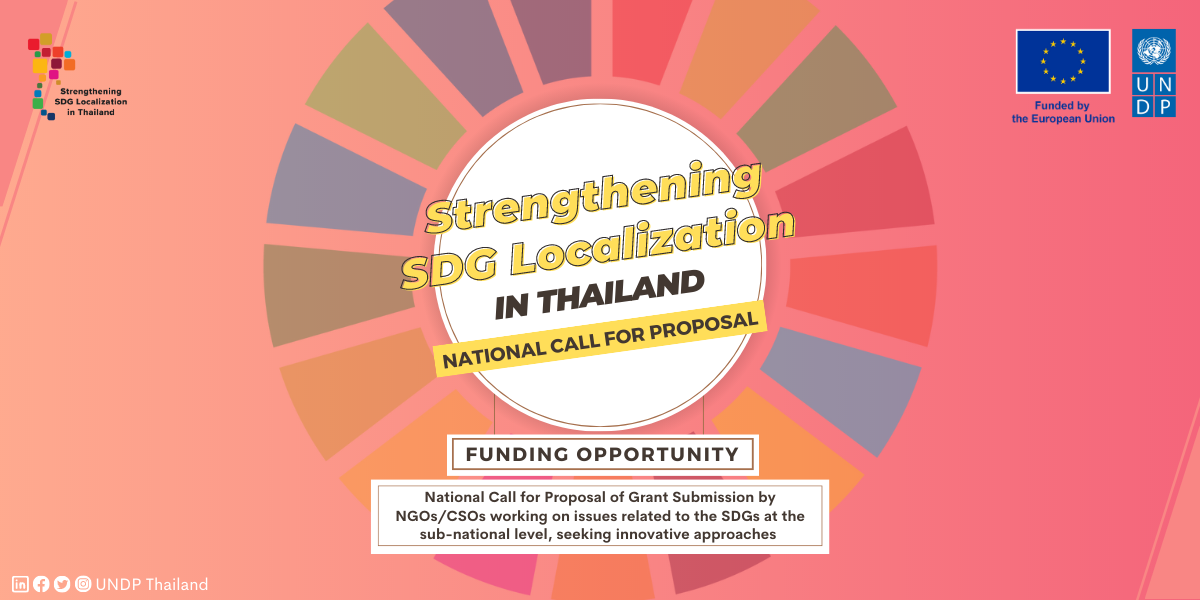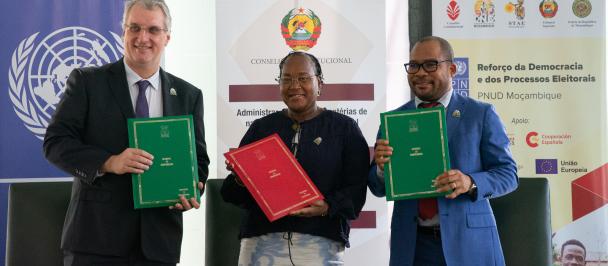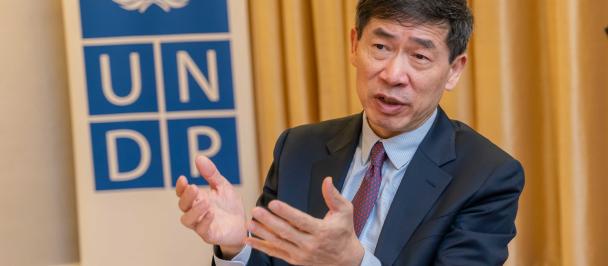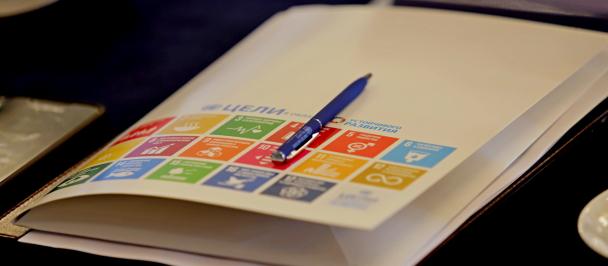Within the framework of Project: “Strengthening SDG Localization in Thailand”
National Call for Proposal for Grant Submission by NGOs/CSOs working on issues related to the SDGs at the sub-national level, seeking innovative approaches
July 12, 2023

A. BACKGROUND
United Nations Development Programme (UNDP) is the United Nations' lead development agency, working to support countries’ endeavors towards achieving the Sustainable Development Goals (SDGs). In Thailand, UNDP is working with the Royal Thai government, civil society, national partners, and the Thai public to find solutions to emerging and persistent development challenges.
The COVID-19 pandemic has severely challenged the progress made towards achieving the SDGs and exposed deepened pre-existing structural inequalities in Thailand. As the crisis impacts individuals differently, the most vulnerable and at-risk groups are slipping further behind, and inequalities are pushed to new heights. It, in turn, represents significant challenges for Thailand to safeguard the progress achieved towards the SDGs. Therefore, it is critical to adopt an inclusive, gender, and human rights-based approach to crisis response and promote a whole-of-society and whole-of-government approach to long-term transformation.
Thailand has recognized the importance of SDG Localization and in 2019 the National Sustainable Development Council made it a priority area. The National Economic and Social Development Council (NESDC) and the Ministry of Interior (MOI) are working in close collaboration to implement this decision and consequently there are several ongoing initiatives on localizing the SDGs. In 2023, UNDP in collaboration with the Ministry of Interior will accelerate the SDGs implementation in the 15 provinces; Chiangmai, Chiangrai, Maehongson, Tak, Udon Thani, Ubon Ratchathani, Nakhon Ratchasima, Petchaburi, Bangkok, SuraThani, Phuket, Songkla, Pattani, Yala and Narathiwat.
As part of the UN system, UNDP offers technical and financial assistance to tackle complex development challenges at subnational level, to strengthen the local integrated governance, ensuring no one is left behind while safeguarding the progress achieved towards the SDGs. These include initiatives aimed at fostering SDG Localization, such as providing technical support to trainings on SDG Localization, local training on Business and Human Rights and Social Innovation, with focus on engaging local communities in finding innovative approaches to the issues they face.
B. PURPOSE OF THE GRANT CONTEST
The grant activities will support civil society that successfully build awareness around the SDGs, build capacity for civil society groups and the general public working on specific issues related to the SDGs, and support initiatives that can lead to new and innovative local development solutions that address the prioritized SDGs in the pilot 15 provinces identified above.
Funds will be allocated to NGOs/CSOs whose projects contribute to addressing one or more of the prioritized SDGs targeting at least one province or more than one province in the pilot 15 provinces. The proposal should also meet criteria and other conditions explained below.
In this regard, the grant will seek:
- To increase the awareness of provincial, local stakeholders and community members, including those from vulnerable groups, of the SDGs and SDG Localization
- To improve capacities of community members, including those from vulnerable groups, for gender responsive and inclusive SDG localization solutions by strengthen a gender-balanced cross-community network of local governments, private sector, and CSOs, including youth and women's organizations, to assess, manage, and share information together with their impacts on various groups in society.
- To enhance entrepreneurial skills and participatory sustainable practices relating to the SDGs.
- To co-design and establish a strong structure of collective cooperatives that help disseminate local initiatives with relevant stakeholders from various sectors in achieving the SDG Goals.
C. SCOPE OF THE GRANT PROGRAMME
The proposals shall take an innovative approach aimed to promote capacity building and awareness raising for those who engage on topics related to accelerating the SDGs at the local level with a special focus on, but not limited to, gender equality, human rights promotion and environmental protection.
In addition, applying organizations shall use a social innovation approach and take into consideration principles of non-discrimination, gender equality and inclusion of marginalized and vulnerable groups when developing proposals. Throughout the implementation of projects, UNDP will support capacity building and transfer necessary knowledge to strengthen grant recipients in effectively adopting those approaches and processes.
Applying organizations are expected to devise proposals which would offer practical solutions to achieve desired results, as explained below in the intervention areas. Applying organizations are encouraged to consider the development of a CSO coalition/platform.
Possible topics for grant projects include but are not limited to:
- Strengthening their livelihoods and resilience by supporting the establishment of social enterprises and community entrepreneurs through awareness-raising, training, and other related support;
- Building capacity for civil society in accelerating the SDGs at the local level with a special focus, but not limited to, gender equality, human rights promotion and environment protection;
- Promoting awareness on youth engagement for climate action;
- Improving knowledge and the promotion of human rights and gender equality;
- Increasing SDG awareness through art, local theatre and youth/children’s clubs;
- Supporting workshops in capacity building towards the SDGs or any specific issue related to the SDGs in the provinces of Thailand;
- Training local farmers and interested persons to be qualified and digitally equipped inspectors of organic agriculture and participatory guaranteed systems and well-equipped and digitally adopted entrepreneurs;
- Establishing the active provincial network of chefs, hotels, restaurants, catering business, and other providers in the tourism/hospitality sector and co-designing mechanisms that promote a local, sustainable, and healthy industry;
- Co-creation and entrepreneurial activities between networks of small-scale producers and institutional buyers to build cross-sector partnership in each province;
- Demonstrating models of inclusive and sustainable practices in the organization of creative festivals and events;
The proposals should include a clearly articulated theory of change and demonstrate how the lasting impact in each area is expected to be achieved. Particular attention will be paid to the community participation and sustainability of proposed actions.
D. ELIGIBILITY CRITERIA (WHO CAN APPLY)
- Non-profit organizations that have at least 2 years of proven experience in project management, policy research, policy analysis, human resource development, service delivery and similar. Experience in managing projects with comparable budget sizes within the last 1 year will be considered an asset. Organizations should be registered in accordance with the legal requirements of the Government of Thailand and must be able to provide organization’s document upon request.
- Non-profit organizations or CSOs applying for this grant need to have proven documents and professional experience or have existing interventions/initiatives with the current local administrations authority, provincial authority and/or related government agencies at the sub-national level.
- Although, not mandatory, CSOs are welcome to submit proposals as coalitions. In this case, main applicants must provide support letters from relevant co-applicants specifying the role of the co-applicant. In case of coalition, the main applicant shall have at least 2 years of proven experience in project management, policy research, policy analysis, human resource development, service delivery and similar, whereas co-applicants shall have at least 1 year of proven experience in the similar areas.
E. PROCEDURES OF GRANT PROPOSAL SUBMISSION
Those wishing to apply for grant under this call for proposal should submit the following:
- Copy of the Registration of the Organization
- Civil Society Organizational Structure
- Resumes of the proposed project team
- Sample of knowledge products (for example Annual Reports, or applicable Research products)
- Proposed Work Plan (See Annex A)
- Budget Form (See Annex A)
IMPORTANT: Please send Grant Submission Form electronically in one file (pdf format), signed and scanned to the following email: LowValueGrants.th@undp.org. The Results and Resources Framework (See Annex B) together with Budget Form (See Annex C) shall be submitted electronically as separate documents in Excel format. If additional clarifications are required, questions can be sent to the same email address indicated above. Answers to questions will be provided within two working days.
Deadline for applications is 23 July 2023, 23:59 hrs Bangkok, Thailand. Applications received after the deadline will not be considered.
Under the small grants programme, UNDP will contribute approximately to a maximum of USD 15,000 for each successful proposal.
Proposals with project staff salary costs exceeding 25% of the total budget will be disqualified without further consideration. Co-funding and in-house contributions are strongly encouraged.
Eligible costs include honorarium/salary, workshops and trainings, rental, stationery and office equipment, printing and translation, creation of online tools and resources, and other costs directly related to this assignment.
Expenditures such as the infrastructure improvement, equipment, maintenance, utilities, overhead and similar costs are ineligible for this grant proposal.
F. PROJECT IMPLEMENTATION TIMEFRAME
The implementation period for approved projects shall not exceed 8 months, counting from the date of the contract signature to the date when all relevant activities have been successfully completed.
G. SELECTION PROCESS
Decisions on awarding grants are made by a Grant Selection Board (GSB). The Board will be comprised of the representatives of relevant UNDP representatives and other experts engaged in this process.
All GSB decisions on funding projects will be taken no later than three weeks after the closing date for applications. UNDP will inform successful applicants in writing no later than two weeks after the date of the GSB decision.
| Note: If the total cost of awards for successful applications exceeds the overall budgeted amount, GSB will award grants according to the total score for each application, starting with the highest scored application, until the available budget has been fully committed. However, if there will still be a number of eligible applications for which grants cannot be awarded due to the insufficient funds available, these non-funded applications will, upon the consent of the GSB, be placed on a reserve list, in descending order of their scores. In the cases where applications awarded grants have subsequently been withdrawn or found non-compliant, applications will be replaced from the reserve list in order of their respective scores for funding. |
| Note: Under exceptional circumstance an individual can be a grantee when legislation prevents excluded and marginalized group (e.g. LGBTQ people, sex workers, people affected by certain illness, etc.) from organizing and attaining legal status. The Head of UNDP Thailand may authorize the proposal if the qualified proposal illustrated the deliverables that best aligned with the project’s output/outcome. |
Applications will be disqualified and will not be further considered, if they:
- Do not comply with the priorities or instructions provided in this announcement;
- Contradict the principles of non-discrimination and gender equality.
H. SELECTION CRITERIA AND SCORING
Proposed projects will be selected based on the criteria outlined in Table 1 below.
Table 1. Selection Criteria and Scoring
| Selection Criteria | Score | |
| 1 | The project clearly demonstrates how it will support the beneficiaries on raising awareness, building their capacity and collective actions, through activities such as workshops on how to align local budgets to the SDGs, promote awareness about youth engagement for climate action, human rights and gender equality, SDG awareness through art, local theatre and youth/children’s clubs, or any specific issue related to the SDGs in the 15 pilot provinces. | Max. 40 points |
| 2 | The project budget is relevant and feasible within the timeframe. | Max. 10 points |
| 3 | The project has provided a plan of its sustainability and scale. | Max. 10 points |
| 4 | The project uses the principles of social innovation in their design, implementation, monitoring, and reporting. | Max. 30 points |
| 5 | The project takes consideration of the principles of human rights-based approach, non-discrimination, gender equality and inclusion of marginalized and vulnerable groups in designing and implementation. | Max. 10 points |
| TOTAL | 100 Points | |
Grants will be awarded in accordance with the nature and relevance of the project. The payment schedule will be agreed before signing the contract.
IMPORTANT: You will be notified by email no later than three (3) working days after we have successfully received your application. If you do not hear from us within this timeframe, please, contact us during the next two days and request confirmation of receipt of the email. Otherwise, UNDP will not be responsible for any potential problems in terms of considering the application.
Attached documents:
Annex A. LOW VALUE GRANT PROPOSAL TEMPLATE
For more details and download application please click here:
English Version Thai Version (PDF)
English Version Thai Version (Word)

 Locations
Locations


